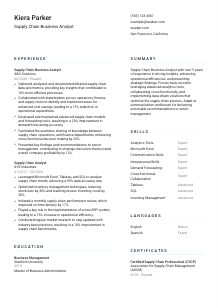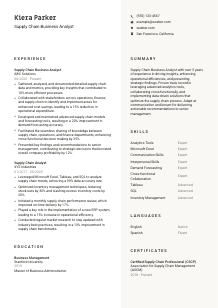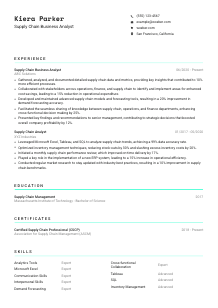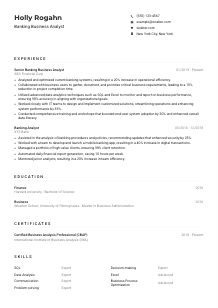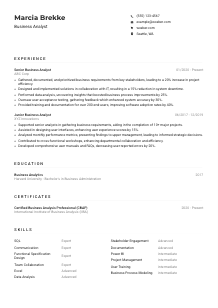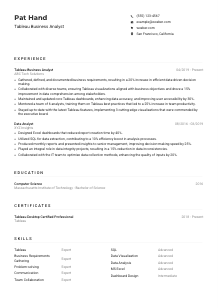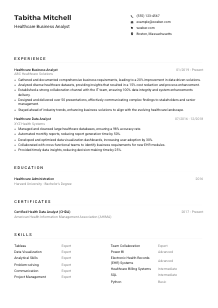Supply Chain Business Analyst Resume Example
Solving supply chain puzzles, but your resume doesn't fit the picture? Decode this Supply Chain Business Analyst resume example, strategized with Wozber free resume builder. Grasp how to weave your analytical insights with job requirements, so your career journey flows as smoothly as streamlined logistics!
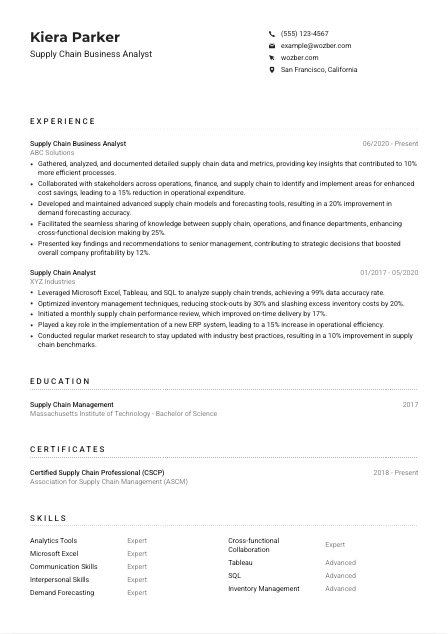
How to write a Supply Chain Business Analyst Resume?
As a Supply Chain Business Analyst, your role is pivotal in knitting together the threads of supply chain management to craft a seamless and efficient fabric of operations. In a role that demands both analytical prowess and operational insight, your resume needs to be a beacon of your capabilities. With Wozber, let's embark on a journey to fine-tune your resume, ensuring it not only meets the eye of an ATS but also resonates with the human touch. Let's sculpt a narrative that showcases your expertise and lands you that coveted Supply Chain Business Analyst position.
Personal Details
The gateway to your resume, the Personal Details section, may seem straightforward, yet it's where the first impression is made. Here's how to make every word count, ensuring you're aligned with the Supply Chain Business Analyst role from the get-go.
1. Branding with your Name
Your name is the marquee of your professional identity. Make sure it's set in a clear, prominent typography to catch the eye immediately. Think of it as the title of your professional story.
2. Job Title Synchronization
Immediately below your name, aligning your current or desired job title, "Supply Chain Business Analyst", with the one in the job listing signals to hiring managers and ATS alike that you're a precise match for the role.
3. Essential Contact Info
Your contact information is your connective thread. Include a phone number and a professional email address formatted as firstname.lastname@email.com. Remember, clarity and accuracy are key.
4. Matching the Geographic Requirement
"Must be located in San Francisco, CA." If you're already based in San Francisco, this detail works to your advantage. Mentioning your location upfront satisfies one of the pivotal logistical requirements, making your candidacy instantly more viable.
5. A Niche for Professional Networks
Consider adding a LinkedIn profile or professional website, ensuring it's meticulously updated to echo your resume's narrative. An ATS might not assess this, but human eyes certainly will appreciate the consistency and depth.
Takeaway
Your Personal Details section is your professional handshake. Ensuring it's concise, professional, and in harmony with the Supply Chain Business Analyst role sets the stage for the detailed narrative that follows. Treat it as your business card within your resume that offers a promising introduction.





Experience
The meat of your resume, the Experience section, must resonate with the demand of the Supply Chain Business Analyst role. Let's delve into how to curate your accomplishments and responsibilities to highlight your fit for the position.
- Gathered, analyzed, and documented detailed supply chain data and metrics, providing key insights that contributed to 10% more efficient processes.
- Collaborated with stakeholders across operations, finance, and supply chain to identify and implement areas for enhanced cost savings, leading to a 15% reduction in operational expenditure.
- Developed and maintained advanced supply chain models and forecasting tools, resulting in a 20% improvement in demand forecasting accuracy.
- Facilitated the seamless sharing of knowledge between supply chain, operations, and finance departments, enhancing cross‑functional decision making by 25%.
- Presented key findings and recommendations to senior management, contributing to strategic decisions that boosted overall company profitability by 12%.
- Leveraged Microsoft Excel, Tableau, and SQL to analyze supply chain trends, achieving a 99% data accuracy rate.
- Optimized inventory management techniques, reducing stock‑outs by 30% and slashing excess inventory costs by 20%.
- Initiated a monthly supply chain performance review, which improved on‑time delivery by 17%.
- Played a key role in the implementation of a new ERP system, leading to a 15% increase in operational efficiency.
- Conducted regular market research to stay updated with industry best practices, resulting in a 10% improvement in supply chain benchmarks.
1. Analyze the Job Description
Dive into the heart of the job description, pinpointing key verbs and responsibilities. Words like 'analyze', 'collaborate', and 'develop' are your guideposts for tailoring your experience.
2. Structuring Experience
Chronologically arrange your roles, spotlighting the most recent position. For each, clearly outline your job title, the company, and the period you were employed, painting a clear timeline of your career trajectory.
3. Crafting Achievement Bullet Points
Under each role, bullet your achievements that mirror the responsibilities of a Supply Chain Business Analyst. Phrases like 'Developed supply chain models', or ‘Collaborated with cross-functional teams' taken directly from the job description should feature here.
4. Quantifying Your Impact
Amplify your accomplishments with quantifiable metrics. Illustrate your narrative with percentages, time frames, and tangible outcomes to give a concise account of your contribution and impact.
5. Relevance Above All
While your diverse skill set is valuable, drowning the hiring manager in unrelated details could be counterproductive. Keep your content streamlined and aligned with the job requirements, ensuring each bullet point reinforces your candidacy for the Supply Chain Business Analyst role.
Takeaway
Your experience section is the cornerstone of your resume, paving the way to showcasing how aptly your career path aligns with the Supply Chain Business Analyst position. Fine-tune it with precision, drawing a direct line from your past achievements to future contributions within the role. Wear your experiences with pride, ensuring they narrate your professional journey with clarity and impact.
Education
While the spotlight often falls on experience, the Education section of your resume can significantly bolster your standing, especially for a Supply Chain Business Analyst role. Let's maximize its potential.
1. Sifting Through Educational Requirements
Start with the basics: pinpoint the exact educational background the job listing requires. For our Supply Chain Business Analyst example, a "Bachelor's degree in Supply Chain Management, Business, Operations Research, or a related field" is your ticket in.
2. Simplify the Structure
Maintain a crisp, easy-to-follow structure: your degree, field of study, the institution, followed by the graduation year. Clarity here makes for an easy scan for both ATS and human eyes.
3. Matching Degrees to Job Descriptions
In cases where your degree directly matches the job's educational requisites, ensure it's boldly cited. Highlighting your 'Bachelor of Science in Supply Chain Management' proves you're built on the foundation they seek.
4. Showcasing Pertinent Courses
If the role is specialized, as with Supply Chain Business Analysts, including specific coursework can underline your hands-on expertise. This could be especially influential for fresh graduates or individuals shifting specializations.
5. Other Educational Highlights
Graduating cum laude? Member of the Logistics Club? Led a noteworthy project in supply chain optimization? These details, while not overbearing, can add color and context to your academic achievements, contributing to a rich candidate profile.
Takeaway
The Education section is a testament to your foundational capabilities and preparedness for the Supply Chain Business Analyst role. Align it with the job's requirements, adding layers of relevancy through courses, achievements, and extracurricular involvement. It's not just about where you learned, but what you've taken away from those experiences.
Certificates
In the quest for the Supply Chain Business Analyst position, certificates are your badges of honor. They show a dedication to continual learning and specialization. Let's navigate this
1. Revisit the Job Needs
Look back at the job posting to distill what, if any, certifications are prioritized. For a Supply Chain Business Analyst, certifications might not be explicitly required, but they undeniably bolster your resume.
2. Prioritizing Relevant Certifications
Choose to list certifications that closely align with the job responsibilities or technologies mentioned. For instance, 'Certified Supply Chain Professional (CSCP)' or 'Certified in Production and Inventory Management (CPIM)' directly reflect the critical competencies sought.
3. Transparency with Dates
Include acquisition or expiration dates of your certifications where applicable. This not only demonstrates recency but also shows a commitment to keeping your skills up-to-date.
4. Pursue Continuous Learning
The landscape of supply chain management is ever-evolving. Show your commitment to staying on the leading edge by actively pursuing new certifications and learning opportunities that elevate your expertise.
Takeaway
Certificates are powerful evidence of your commitment to personal growth and professional excellence. Selectively listing those that resonate with the Supply Chain Business Analyst role speaks volumes to hiring managers. Keep this section meticulously updated, letting your pursuit of excellence shine.
Skills
The Skills section serves as the highlight reel of your professional toolkit. For a Supply Chain Business Analyst, this is where you distill your capabilities into a potent snapshot that speaks volumes.
1. Targeted Skills Extraction
Begin with a forensic analysis of the job listing. Identify both hard and soft skills explicitly and implicitly required, such as 'proficiency in analytics tools' and 'excellent communication'.
2. Curate a Concise List
Less is more if each skill listed is a direct hit. Aim for a blend of technical and soft skills like 'Microsoft Excel', 'Tableau', 'SQL', alongside 'communication skills', and 'cross-functional collaboration'.
3. Organized Display
Present your skills in a neat, easily digestible format. Categorizing them into technical skills, analytical skills, and interpersonal skills can aid the hiring manager in recognizing your well-rounded competency.
Takeaway
Your skills section is your professional canvas. Paint it with the most relevant and compelling skills for the Supply Chain Business Analyst position. This is your opportunity to impress upon the hiring manager your readiness and capacity to excel in the role. Keep this section sharp, targeted, and constantly evolving.
Languages
In the interconnected realm of supply chain management, linguistic abilities can be a unique lever in your professional toolkit. Let's unpack how to showcase your linguistic prowess in a manner that aligns with the Supply Chain Business Analyst role.
1. Job Language Specifications
Parse the job listing for language requirements. For our position, "Strong English communication skills needed" were explicitly stated, making it a non-negotiable skill.
2. Flaunt Your Language Proficiency
List English at the top of your language skills, rating your proficiency as 'Native' or 'Fluent'. This aligns directly with the job requirement and shows attention to detail.
3. Additional Languages as an Asset
Following the primary language requirement, list any additional languages you're proficient in. This adds depth to your profile, especially for roles that may involve international interactions.
4. Honest Proficiency Ratings
Be genuine in rating your language skills. Using terms like 'Fluent', 'Intermediate', or 'Basic' helps set realistic expectations and demonstrates honesty in self-assessment.
5. Relevance to the Role
For positions with a global outlook or operations spanning across different linguistic regions, highlighting your multilingual proficiency can significantly enhance your attractiveness as a candidate.
Takeaway
Your linguistic skills are more than mere footnotes on your resume; they are doorways to new perspectives and modes of collaboration. Display them with pride, understanding their value in the global business landscape. Even a 'Basic' proficiency is a step towards connecting in the multilingual world of supply chain management.
Summary
The summary section serves as your resume's opening argument. It's where you distill your professional journey, skills, and achievements into a persuasive and cohesive narrative. It sets the tone for everything that follows.
1. Capturing the Job Essence
Absorb the core demands and spirit of the role, reflecting this understanding in your summary. Begin with a strong, identity-defining statement like, 'Supply Chain Business Analyst with over 5 years of experience'.
2. Introducing Yourself
Proceed to introduce your professional self, focusing on your specializations and major accomplishments. This is your chance to highlight how your journey aligns with the expectations for a Supply Chain Business Analyst.
3. Meeting Key Requirements Head-on
Directly address the critical skills and achievements that make you an ideal candidate. Match your qualifications with the job listing to paint a vivid picture of your fit for the role.
4. Keeping it Snappy
Your summary is a teaser, not the full feature. Aim for punchy, compelling lines that invite the reader to dive deeper into your resume. Make every word count, leaving them intrigued and wanting more.
Takeaway
Consider your summary as the headline of your professional story, captivating and succinct. Tailor it to echo the essence of the Supply Chain Business Analyst role, ensuring it's a magnetic introduction that sets a promising tone for the narrative that unfolds. A well-crafted summary not only aligns with the job requirements but also entices hiring managers to engage with your profile fully.
Launching Your Supply Chain Business Analyst Journey
Congratulations, armed with this guide, you're poised to craft a resume that not only resonates with ATS systems but also sparkles with the depth of your experience and aspirations. Use Wozber's free resume builder, including the ATS-friendly resume templates and ATS resume scanner, and let this toolkit be the wind beneath your career wings. Remember, each section of your resume is a chapter in your professional story.
Approach it with care, enthusiasm, and a clear vision of your goal—the Supply Chain Business Analyst role awaits. Forge ahead, weave your narrative, and let your journey begin!

- Bachelor's degree in Supply Chain Management, Business, Operations Research, or a related field.
- Minimum of 3 years of experience in supply chain management or related analytical roles.
- Proficiency in using analytics tools such as Microsoft Excel, Tableau, and SQL.
- Strong understanding of supply chain processes, demand forecasting, and inventory management.
- Excellent communication and interpersonal skills to collaborate with cross-functional teams.
- Strong English communication skills needed.
- Must be located in San Francisco, CA.
- Gather, analyze, and document detailed supply chain data and metrics to provide insights and drive actionable initiatives.
- Collaborate with stakeholders to identify areas for process improvement, cost reduction, and enhanced efficiency within the supply chain.
- Develop and maintain supply chain models, forecasting tools, and dashboards to monitor key performance indicators.
- Facilitate communication and knowledge sharing between supply chain, operations, and finance teams.
- Present findings, reports, and recommendations to senior management and contribute to strategic decision-making.





